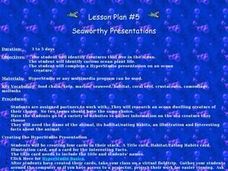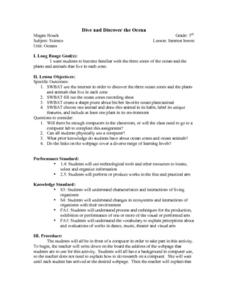American Museum of Natural History
Ocean Creature Feature
From coloring to hard protective shells, ocean creatures have adaptation features that help them survive. An eight-question online quiz highlights different ocean animals and their unique characteristics. The resource then offers pop-up...
NOAA
Build Your Own Ocean Ecosystem
Hold the sea in the palm of your hand! Amateur oceanographers work together to create models of an ocean ecosystem in the sixth and final installment in a series. Raise awareness of global ocean health issues through guided research,...
Curated OER
Oceanic Habitat Zones
Students explore ocean habitats. In this oceanic environment activity, students research various habitats in the ocean. Then, in a jigsaw format, students teach others in the class about the habitat they researched.
NOAA
Deep-Sea Ecosystems – Entering the Twilight Zone
Imagine an ecosystem without any light or oxygen, where living things convert carbon dioxide into food. This ecosystem is thriving and might just be the largest ecosystem on our planet, yet we know very little about it. The lesson...
Curated OER
Where Did They Come From?
Give science learners nine questions about the biogeography of hydrothermal vents and turn them loose to research this fascinating habitat. Working in cooperative groups, they prepare a report that addresses each of the questions. A...
Curated OER
Animal Habitats
Students research an animal and their habitat. In this animal habitat lesson, students observe a WebQuest that describes the different habitats: deserts, tundra, rainforest, forest, and ocean. They determine which habitat their animal...
NOAA
I Can't Breathe!
The Gulf of Mexico dead zone, an area of low oxygen that kills marine life, costs the United States $82 million every year. Young scientists research anoxic ocean environments then come up with a hypothesis for the cause of the Gulf of...
NOAA
Stressed Out!
Are our oceans really suffering due to the choices humans make? The sixth and final installment in the volume of activities challenges research groups to tackle one of six major topics that impact ocean health. After getting to the...
NOAA
Fishy Deep-sea Designs!
Oceans represent more than 80 percent of all habitats, yet we know less about them than most other habitats on the planet. The instructor introduces the epipelagic, mesopelagic, bathypelagic, twilight, and midnight zones in the ocean....
American Museum of Natural History
They Glow!
Would you believe marine animals can make their own light? An online resource describes the process of bioluminescence and how animals in the ocean use it to survive. The lesson features a catchy tune that describes the behavior of ocean...
Curated OER
Sea Horse Habitats
Students research sea horses around the world. In this sea horse habitats lesson, students use the Internet to take a virtual tour of a sea horse in its natural habitat. Students work in groups to study a geographical region such as...
Curated OER
Seaworthy Presentations
First graders research ocean animals and plants on the web. In this ocean habitat lesson, 1st graders prepare a multimedia presentation. Students will work on their presentations in pairs and every group should have its own animals or...
Curated OER
Habitats
Second graders identify characteristics of various habitats. In this habitats instructional activity, 2nd graders read Where the Forest Meets the Sea and Swimmy to identify the settings of different habitats. Students construct murals of...
Curated OER
Life in the Crystal Palace
Marine biologists research sea ice communities. Assign some groups to construct paper models of sea ice communities in winter, and some to construct models of them in summer. The lesson is simplistic, but the Internet resources provided...
Curated OER
Exploring Deep Ocean Habitats: Alien Invasion
Students compare and contrast "alien species" and "invasive species."Students explain positive and negative impacts associated with introduction of non-native species, and give a specific example of species that produce t
Curated OER
Design a Reef!
Middle schoolers explore coral reef ecosystems. In this ecosystems science lesson, students research coral reef ecosystems to determine the major functions the participating organisms must perform. Middle schoolers construct a...
Curated OER
Animal Habitats
Learners explore animal lifestyles by researching their characteristics. In this animal habitat lesson, students read the story Over in the Jungle and analyze the animal illustrations in the book. Learners create clay animal characters...
Curated OER
Blue Planet: Open Ocean
Students research facts about animal species. In this ocean instructional activity students view a video, prepare illustrated cards and create a food-web display.
Curated OER
Animals of the Lost City
Begin with a demonstration of exothermic reactions and discussion of chemosynthesis. Your aspiring oceanographers research vent communities and then craft a mural of a vent community. This is a terrific method of introducing learners to...
Curated OER
Specialized for the Sea
Students use pictures and make a mural to investigate how ocean animals are adapted to certain parts of their environment.
Curated OER
Critters in the Classroom
Students investigate with sea urchins. In this ocean habitat lesson, students observe sea urchins and other ocean grazers. Students work with lab equipment to examine the anatomy of these creatures.
Curated OER
Tracking Narwhals in Greenland The Ocean Unicorn
Learners study the ecology, habitats, geographic range and feeding habits of narwhals. They determine at least three reasons for the decline in the narwhal populations and complete the accompanying worksheets.
Curated OER
Dive and Discover the Ocean
Third graders investigate the three zones of the ocean and the plants and animals that live in each zone. Projects produced are shared with classmates in a share circle where the unique features of the animal and zone selected are...
Curated OER
Marine & Aquatic Habitats Activities - Creatures in the Coral
Students describe unique adaptations of organisms that live in the coral reef habitat, read various books pertaining to coral reefs and ocean life, and construct a wheel demonstrating the relationships between certain coral reef...
Other popular searches
- Deep Ocean Habitats
- Deep Ocean Habitats
- Ocean Habitats Year 2
- Science Ocean Habitats
- Ocean Habitats Math
- Ocean Habitats Producers
- Ocean Habitats Inquiry Based
- Ocean Habitats Inquiry
- Ocean Habitats Language Arts
- Powerpoint Ocean Habitats

























